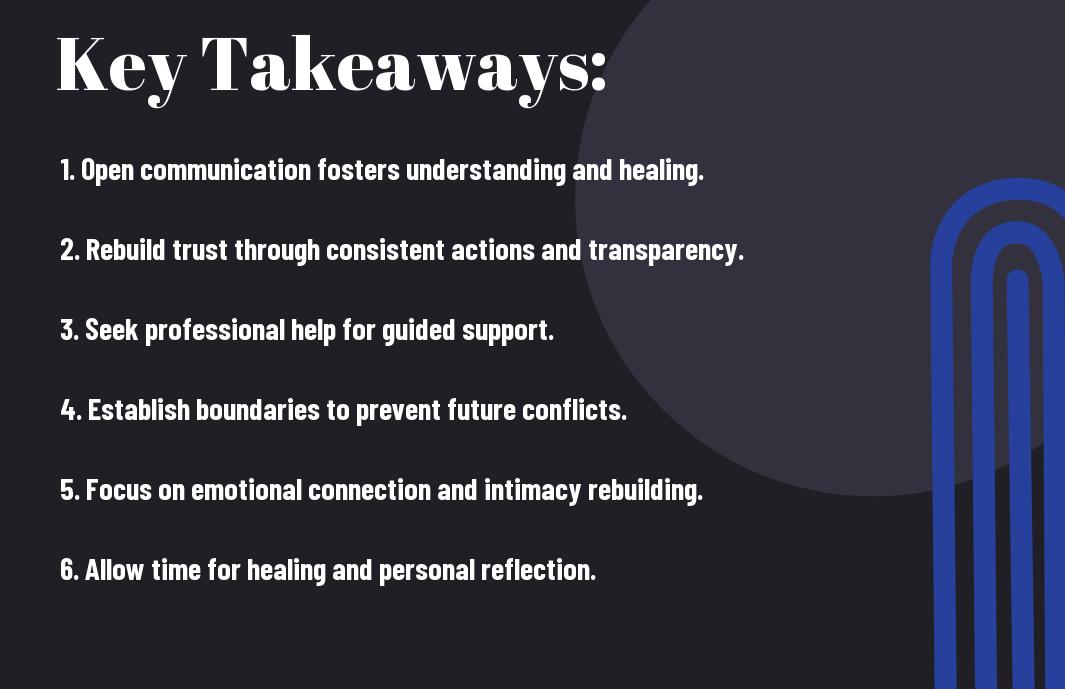Many couples face the heart-wrenching challenge of infidelity, and if you find yourself in this painful situation, understanding the next steps is crucial. In this post, you’ll discover real solutions that can help you navigate the tumultuous waters of betrayal. You will learn how to process your feelings, communicate effectively with your partner, and establish a path toward healing and rebuilding trust. The journey may be difficult, but with determination and the right strategies, your relationship can emerge stronger than ever.
Key Takeaways:
- Infidelity can be a wake-up call for couples, prompting a deeper exploration of relationship dynamics.
- Open and honest communication is necessary for rebuilding trust and repairing the relationship.
- Understanding the underlying issues that led to infidelity can help couples address the root causes of their problems.
- Seeking professional help, such as couples therapy, can provide valuable tools and support during the healing process.
- It’s important to create a safe space for both partners to express their feelings and emotions without judgment.
- Setting boundaries and establishing new commitments can help redefine the relationship moving forward.
- Patience and time are key components in the healing process, allowing both partners to process their emotions and thoughts.

Understanding Infidelity
Before delving into survival strategies, it’s imperative to grasp the essence of infidelity. Understanding how and why infidelity occurs can pave the way for healing and rebuilding trust in your relationship. Infidelity doesn’t just involve physical acts; it encompasses emotional betrayals that can be equally damaging. By addressing both partners’ feelings and motivations, you can foster an environment conducive to recovery.
Types of Infidelity
By recognizing the various types of infidelity, you can better understand your situation. Here are the most common forms:
- Emotional Infidelity
- Physical Infidelity
- Cyber Infidelity
- Romantic Infidelity
- Situational Infidelity
This differentiation can guide your healing efforts and help clarify your emotions.
The Emotional Impact
With infidelity comes a whirlwind of emotions that can feel unbearable. You may experience feelings of betrayal, anger, and sadness that can overwhelm your daily life. Coping with these powerful emotions is important for your mental and emotional health. Many individuals describe a sense of loss and confusion, leaving you questioning your worth and the future of your relationship. Seeking support can be a vital step in navigating these turbulent feelings.
Even as you process these emotions, recognize that they are a natural response to what has happened. You may feel a mix of grief, shame, and anger; understand that these reactions are common after an incident of betrayal. The emotional scars can impact not just your relationship but also your self-esteem and overall well-being. In this trying time, allow yourself the space to grieve the loss of trust and seek constructive avenues for healing, whether through therapy, support groups, or open communication with your partner.

Communication Strategies
Clearly, effective communication is the cornerstone of healing after infidelity. It’s important to establish a safe space where both partners can express their feelings openly and honestly. This process requires a commitment to transparency, patience, and a willingness to confront difficult emotions in order to build trust once again.
Opening the Dialogue
One of the first steps in addressing the aftermath of infidelity is to open a dialogue with your partner. Initiate this conversation in a neutral setting where both of you feel comfortable. Make it clear that you are ready to listen and share, setting aside any distractions that could hinder an honest exchange.
Active Listening Techniques
After you’ve initiated the conversation, it’s crucial to practice active listening to fully understand your partner’s perspective. Set aside your assumptions and genuinely engage with what they are saying. By doing so, you validate their feelings and reinforce your commitment to working through the pain together.
At this stage, incorporating active listening techniques can transform your conversations. Focus on maintaining eye contact, which shows you are present and attentive. Paraphrase what your partner shares to confirm your understanding, such as saying, “What I’m hearing is…” This not only demonstrates that you are listening but also encourages your partner to clarify their thoughts. Additionally, avoid interrupting and instead let them express themselves fully, which cultivates a sense of respect and trust. Embracing these techniques can significantly enhance your communication and help both partners feel heard and valued throughout the healing process.
Rebuilding Trust
For couples grappling with the aftermath of infidelity, the path to rebuilding trust can be daunting but vital. It involves open communication, accountability, and a commitment to understanding the underlying issues that contributed to the betrayal. By working together sincerely and intentionally, you can create an environment where trust can flourish once more.
Steps to Reestablish Trust
About reestablishing trust, engaging in honest conversations is vital. Start by clearly discussing feelings and expectations. You should both express your needs and fears while being open to each other’s perspective. Regular check-ins and reaffirming your commitment to each other will help reinforce the healing process.
Setting Boundaries
Against past transgressions, it becomes imperative to set clear boundaries moving forward. Establishing mutual expectations regarding communication, time apart, and interactions with others will aid in reinforcing your commitment to the relationship.
It is vital to identify what behaviors are acceptable and which ones jeopardize your healing. Setting strong boundaries can help mitigate feelings of insecurity and betrayal. Make sure both you and your partner agree on rules concerning friendships, social engagements, and even digital communications. Clarity about these boundaries allows both individuals to safeguard their emotional well-being, fostering a sense of safety and protection, and ultimately leading to a more trusting relationship moving forward.
Seeking Professional Help
Many couples find that navigating the aftermath of infidelity is challenging, and seeking professional help can provide vital support. A therapist experienced in infidelity can guide you through the complex emotions and communication barriers that may arise, helping both partners understand their feelings, rebuild trust, and work towards healing. Professional guidance creates a safe space to explore difficult topics and navigate the path to recovery together.
Benefits of Couples Therapy
Below are some valuable benefits you can gain from couples therapy. It provides a structured environment where you and your partner can express your feelings openly. Therapy helps you identify underlying issues that may have contributed to the infidelity, promotes effective communication skills, and fosters emotional intimacy. Ultimately, couples therapy can elevate your relationship to a healthier level by encouraging mutual understanding and respect.
Choosing the Right Therapist
After recognizing the need for professional help, selecting the right therapist is vital for your healing journey. You want someone who specializes in relationship issues, particularly infidelity, and one who aligns with your values and preferences. An effective therapist will create a non-judgmental atmosphere, allowing both partners to express themselves freely while guiding you toward actionable solutions.
Professional therapists often have different styles and approaches, so it is important to choose someone who makes you both feel comfortable. Look for a therapist with credentials in couples therapy and experience with infidelity, as this will significantly enhance your chances of success. You might also consider a therapist’s communication style and whether they prioritize making both partners feel heard. Ultimately, the right fit can lead to a *more constructive therapeutic experience*, one that enables you and your partner to heal and grow together.
Moving Forward Together
Your journey to healing after infidelity can be a turning point in your relationship. It requires commitment, communication, and understanding from both partners. By addressing issues together and setting new goals, you can lay the foundation for a renewed bond built on trust and intimacy. Embrace the challenges as opportunities for growth, and focus on creating a future that aligns with both of your aspirations.
Creating a Shared Vision
Beside you on this journey, it is vital to establish a shared vision for your relationship. Sit down together and discuss your aspirations, goals, and values, ensuring both voices are heard. This collaborative effort helps build a strong foundation for your future and reinforces your commitment to one another.
Celebrating Progress
An important aspect of moving forward is taking time to celebrate progress. Acknowledge the small victories along the way, whether it be improved communication or heightened emotional intimacy. These celebrations serve not only to strengthen your bond but also to remind you both of the resilience and dedication you’ve shown in overcoming adversity.
Another way to enhance your relationship and promote healing is by regularly recognizing and celebrating your accomplishments, no matter how small. Every step forward is a sign of your growth and dedication. By openly expressing appreciation for each other’s efforts, you cultivate a positive atmosphere that nurtures trust and love. Set aside time to reflect on these progress points together; it fosters a sense of unity and reinforces your commitment to moving beyond the past. Keep in mind, these celebrations serve as milestones on your journey, reinforcing the strength of your relationship and the depth of your connection.

Personal Growth and Healing
After experiencing infidelity, you may find that personal growth and healing can transform your relationship. Engaging in Infidelity Support Forums – Message Boards to Help the … can provide insight and community as you navigate this difficult journey.
Individual Reflection
An important part of healing involves individual reflection. Take time to assess your values, emotions, and the impact of the betrayal on your sense of self. This process can lead to a deeper understanding of your needs and desires moving forward.
Self-Care Practices
Between focusing on your emotions and navigating challenges, practicing self-care is vital for your well-being. Prioritize activities that nourish your body and mind, such as exercise, meditation, or hobbies that bring you joy.
SelfCare strategies can significantly enhance your recovery process. Engage in daily exercise to boost your mood, or practice mindfulness meditation to center your thoughts. It’s also beneficial to nurture your relationships with supportive friends and family, allowing you to express your feelings openly. By incorporating healthy routines and prioritizing your emotional needs, you’re taking concrete steps toward lasting healing and growth.
Conclusion
To wrap up, navigating the complex emotional landscape of infidelity can be challenging, but with the right strategies, you can rebuild trust and intimacy in your relationship. By prioritizing open communication, seeking professional help, and committing to mutual growth, you can transform this painful experience into an opportunity for deeper connection. It’s crucial to approach healing as a journey rather than a destination, allowing yourself and your partner the time and space needed to foster understanding and resilience. With dedication and commitment, you can emerge stronger together.
FAQ
Q: What is “Surviving Infidelity – Real Solutions for Real Couples” about?
A: This book provides practical guidance and support for couples navigating the challenges of infidelity. It emphasizes understanding the emotions involved, exploring the reasons behind the betrayal, and implementing strategies for healing and rebuilding trust. The authors share real-life stories and solutions that highlight diverse paths to recovery.
Q: Who is the intended audience for this book?
A: “Surviving Infidelity” is designed for couples facing the aftermath of an affair. Whether partners are considering reconciliation or undecided about their future, this book caters to anyone seeking insights into overcoming betrayal and strengthening their relationship.
Q: What types of strategies are discussed in the book?
A: The book covers a range of strategies, including effective communication techniques, methods for processing emotions, and actionable steps to rebuild trust. It also discusses the importance of individual healing, setting boundaries, and fostering a supportive environment for recovery.
Q: Does the book address the different perspectives of both partners?
A: Yes, “Surviving Infidelity” thoughtfully considers the viewpoints of both the betrayed partner and the individual who strayed. It encourages understanding, empathy, and open dialogue, helping both partners to navigate their feelings and experiences as they work through the complexities of infidelity.
Q: Can this book be beneficial for couples who have not experienced infidelity but want to strengthen their relationship?
A: Absolutely. While the primary focus is on recovery from infidelity, the principles and tools outlined in the book are applicable to any relationship. Couples looking to enhance their communication skills, deepen emotional intimacy, or develop strategies for conflict resolution will find valuable insights throughout its pages.
